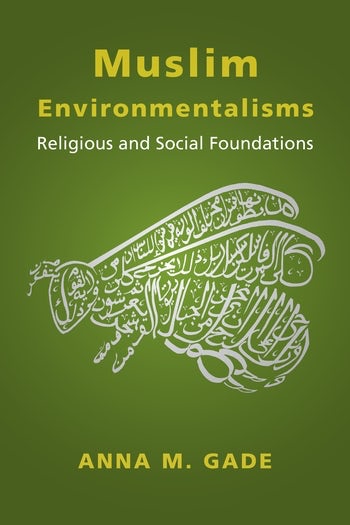A Response to Anna Gade’s Muslim Environmentalisms by Rosemary Hancock, The University of Notre Dame Australia
When I began studying Islamic environmental activism for my doctoral project in 2011, the phenomenon was perceived as marginal and received very little attention from scholars of both Islam, and the environment. So I was delighted to listen and respond to Gade’s interview, and see the positive reception to her recent book Muslim Environmentalisms. The book is an exciting and valuable contribution to Islamic studies and the environmental humanities. Her examination of the theoretical and discursive basis to Muslim environmentalisms – and in particular her empirical focus on Southeast Asia – significantly broadens the academic conversation that has been building around Islamic environmentalisms in the last decade.
Listening to her interview on the Religious Studies Project, what I found particularly appealing was that Gade seeks to expand our understanding of what can be environmental or Islamic through her case study of Southeast Asia. In doing so, she highlights the incredible diversity of practice and discourse that coalesces around the frame of Muslim or Islamic environmentalism, and the importance of engaging with phenomenon as they are in-context.
Gade is clearly critical of the ‘developmentalist’ discourse that applies a narrow and essential ‘Islamic’ framework to environmental work in Muslim-majority contexts, usually for instrumental reasons. She also critiques the use and widespread circulation of a small number of scriptural references within a global Islamic environmental discourse – scriptural quotations that can be ‘read’ to support Western-style environmentalism. Scholars examining religious environmentalism in other contexts have noted similar trends, for example, Emma Tomalin’s excellent work on Buddhism and Hinduism and the ascription of a supposedly ‘inherent’ environmentalism that misunderstands the religious and cultural nature of particular practices. Both environmental practitioners, and scholars of religious environmentalisms, have too often employed reductive and essential notions of what constitutes any given religious tradition – and indeed, what constitutes environmentalism.
However, the development of a ‘global’ and fairly narrow Islamic environmental discourse cannot entirely be reduced to the instrumentalising of religious tradition by development and environmental organisations. Gade’s acknowledgement of the ‘hybrid’ nature of Muslim environmentalisms is an important concession to the ways in which not only environmental and Islamic discourse circulates globally, but also to the fact Muslims environmentalisms emerge in a wide variety of global contexts. The conversation on ‘authenticity’ and whether one can claim something constitutes ‘true’ or ‘good’ Islam or environmentalism is, given the diversity of Muslim environmentalisms, fascinating. Whilst as a scholar Gade, like myself, resists any pressure to make claims of this kind, Muslim environmentalists themselves are sometimes concerned with authenticity.
My research with Muslim environmentalists was grounded in an entirely different context to that of Gade’s study in Southeast Asia: it examined Muslim environmentalists in the United States and Great Britain, and the groups operated in a context where ‘environmentalism’ – even in Muslim communities – is understood primarily through the classic framing Gade describes as inherent to her discipline of environmental humanities: a concern with the preservation of nature and wilderness, and practices aimed variously to modify, mitigate, or oppose the degradation and destruction of nature from human industry (Hancock 2018, 70-79; 2020a, 292).
Some activists in my study were located in Muslim communities where fear of bida’h (innovation) crippled any attempt to grow the support base of their environmental group or take environmental action (Hancock 2018, 94). The activists felt compelled to portray ‘environmentalism’ – which, as noted above, was typically understood through Western frameworks – as somehow inherent to the Islamic tradition. In these circles references to the stereotypical ‘environmental’ extracts from the Qur’an or collections of Hadith were common that Gade critiques were common. Where some organisations claimed this synthesis of Western environmentalism with Islamic scripture and tradition was effective at changing the behaviour of Muslims (Hancock 2018, 89-90), most continued to find theological interpretation and education alone insufficient to effect real change in their communities (Hancock 2020b, 156).
Whilst initially Gade’s work may present an opportunity for Muslim environmentalists concerned with the ‘authenticity’ of an environmentalism shaped by Western conceptions of nature and crisis to side-step the issue by adopting an environmentalism found entirely within Islamic tradition and cultures, I find that we return to the problem of context. The environmentalism Gade articulates as emerging from her fieldwork in Southeast Asia, and the ways in which the participants in her research understood and used Islamic tradition and scripture, is grounded in that particular geographical, historical, and cultural location. Just as forcing Western environmental concepts and frameworks onto their work would be inappropriate, so Muslim environmentalists in Western contexts need to construct an environmentalism that speaks to their geographical, historical, and cultural location.
One of the most exciting aspects of Gade’s work is her effort to decolonize the environmental humanities by showing how concepts from within the Islamic tradition can expand understandings of what constitutes ‘environment’. Resisting ‘theoretical colonization’ (Bayat 2005) by refusing to apply Western concepts to non-Western contexts is only the first step in decolonizing academic disciplines and discourse – Gade takes the second step in having the Islamic tradition speak back into Western theory. As Amanda Baugh pointed out in her response to Gretel Van Weiren’s interview on the Religious Studies Project in October 2020, the study of religion and ecology has a whiteness problem. This echoes the more general ‘whiteness problem’ of Western environmental movements – but, as Baugh argued in her response and I pointed out above, scholars who approach the study of religion and ecology ‘uncritically … perpetuate a colonial project’ that essentializes both “religion” and the “environment”. Gade’s discussion, and indeed her book, gestures to those of us who study religious environmentalisms a potential avenue out of both the trap of essentialism and of critique with no constructive alternative.
References
Bayat, Asef, 2005. “Islamism and Social Movement Theory.” Third World Quarterly 26 (6): 891-908.
Hancock, Rosemary, “Islamic Environmentalists, Activism, and Religious Duty” in Mario Peucker and Merve Keyiki (eds.) Muslim Volunteering in the West: Between Islamic Ethos and Citizenship. (Palgrave Macmillan, 2020b), 141-160.



